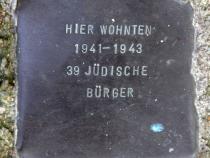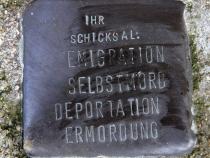Location
Solinger Straße 10
District
Moabit
Stone was laid
September 2003
Born
30 September 1871 in Posen / Poznań
Survived
Georg Paul Grünbaum was born on 30 September 1871 in the town of Posen, the son of Sophie (née Zadek) and Isaak Grünbaum. His father ran the family business, Jakob Zadek. Georg Grünbaum attended grammar school in Posen to completion of the basic curriculum and then trained at the school of weaving in Berlin. After gaining his leaving certificate, he returned to Posen and completed a commercial apprenticeship in his father’s business. On 19 July 1904, he married Elisabeth Brann, eight years’ his junior. They had two children; their daughter Liselotte was born in October 1905 and their son Herbert was born in August 1917.
After the re-founding of the Polish state following the First World War, Georg Grünbaum asserted his option right to settle in Germany and in October 1920 moved with his family to Moabit, Berlin. Here, the Grünbaum family lived on the corner of Agricola and Solinger Straße (their address until about 1933 was Agricola Straße 21, then Solinger Straße 10) for over 15 years.
In 1923, Georg Grünbaum and his brother Max took over the company Wilhelm Reschke, a wholesale business dealing in textiles, haberdashery and toys at Neue Friedrich Straße 71 (now part of Roch Straße) in Mitte. Some time later, Siegfried Gutkind and Simcho Maß joined them as co-partners, followed by Gerhard Tonn (Max Grünbaum’s nephew).
In spring 1933, the company co-partners, who were all Jewish, were abducted by SA men, taken into a cellar and beaten with rubber truncheons. Georg Grünbaum was the only one to escape the attack as he happened to be out of town. In the following years, his children left Nazi Germany. Liselotte emigrated with her husband, a medical doctor named Dr. Erich Koplowitz, to Spain in 1934. Two years later his son Herbert, though still a minor, left for Switzerland.
In early May 1936, Georg Grünbaum and his wife moved to an apartment at Gustloff Straße 51 (now Dernburg Straße) in Charlottenburg. The following year, he was arrested on the grounds that he had been found to own securities abroad and was therefore guilty of currency fraud. Despite professing his innocence and presenting evidence to the contrary, he was held in remand for several days without being able to contact his wife. During the November pogrom in 1938 and the ensuing weeks, Georg Grünbaum lived in constant fear of arrest. Every time the doorbell rang, he hid in a WC on a landing between the floors on the back stairs. In the same month, his company was ‘Aryanised’. Georg Grünbaum and the other co-partners were forced to sell the business for 20,000 Reichmarks – a mere 20 percent of its actual value. Following the forced sale of the business, Georg Grünbaum was a broken man and chronically ill, his wife later stated. After years of trying to obtain the necessary documents, in January 1941 Georg Grünbaum and his wife finally managed to join their daughter in Spain.
Two of Georg Grünbaum’s siblings were murdered in the Shoah, including his brother Max, who was deported in 1942. The other partners in the Reschke company all survived by emigrating to Palestine or Australia.
Georg Grünbaum spent the last years of his life in Spain, severely ill and suffering from constant anxiety. Initially he and his wife lived in their daughter’s house but moved into their own apartment in May 1944. Georg Grünbaum died on 10 January 1946, aged 74, in Madrid.
After the re-founding of the Polish state following the First World War, Georg Grünbaum asserted his option right to settle in Germany and in October 1920 moved with his family to Moabit, Berlin. Here, the Grünbaum family lived on the corner of Agricola and Solinger Straße (their address until about 1933 was Agricola Straße 21, then Solinger Straße 10) for over 15 years.
In 1923, Georg Grünbaum and his brother Max took over the company Wilhelm Reschke, a wholesale business dealing in textiles, haberdashery and toys at Neue Friedrich Straße 71 (now part of Roch Straße) in Mitte. Some time later, Siegfried Gutkind and Simcho Maß joined them as co-partners, followed by Gerhard Tonn (Max Grünbaum’s nephew).
In spring 1933, the company co-partners, who were all Jewish, were abducted by SA men, taken into a cellar and beaten with rubber truncheons. Georg Grünbaum was the only one to escape the attack as he happened to be out of town. In the following years, his children left Nazi Germany. Liselotte emigrated with her husband, a medical doctor named Dr. Erich Koplowitz, to Spain in 1934. Two years later his son Herbert, though still a minor, left for Switzerland.
In early May 1936, Georg Grünbaum and his wife moved to an apartment at Gustloff Straße 51 (now Dernburg Straße) in Charlottenburg. The following year, he was arrested on the grounds that he had been found to own securities abroad and was therefore guilty of currency fraud. Despite professing his innocence and presenting evidence to the contrary, he was held in remand for several days without being able to contact his wife. During the November pogrom in 1938 and the ensuing weeks, Georg Grünbaum lived in constant fear of arrest. Every time the doorbell rang, he hid in a WC on a landing between the floors on the back stairs. In the same month, his company was ‘Aryanised’. Georg Grünbaum and the other co-partners were forced to sell the business for 20,000 Reichmarks – a mere 20 percent of its actual value. Following the forced sale of the business, Georg Grünbaum was a broken man and chronically ill, his wife later stated. After years of trying to obtain the necessary documents, in January 1941 Georg Grünbaum and his wife finally managed to join their daughter in Spain.
Two of Georg Grünbaum’s siblings were murdered in the Shoah, including his brother Max, who was deported in 1942. The other partners in the Reschke company all survived by emigrating to Palestine or Australia.
Georg Grünbaum spent the last years of his life in Spain, severely ill and suffering from constant anxiety. Initially he and his wife lived in their daughter’s house but moved into their own apartment in May 1944. Georg Grünbaum died on 10 January 1946, aged 74, in Madrid.




